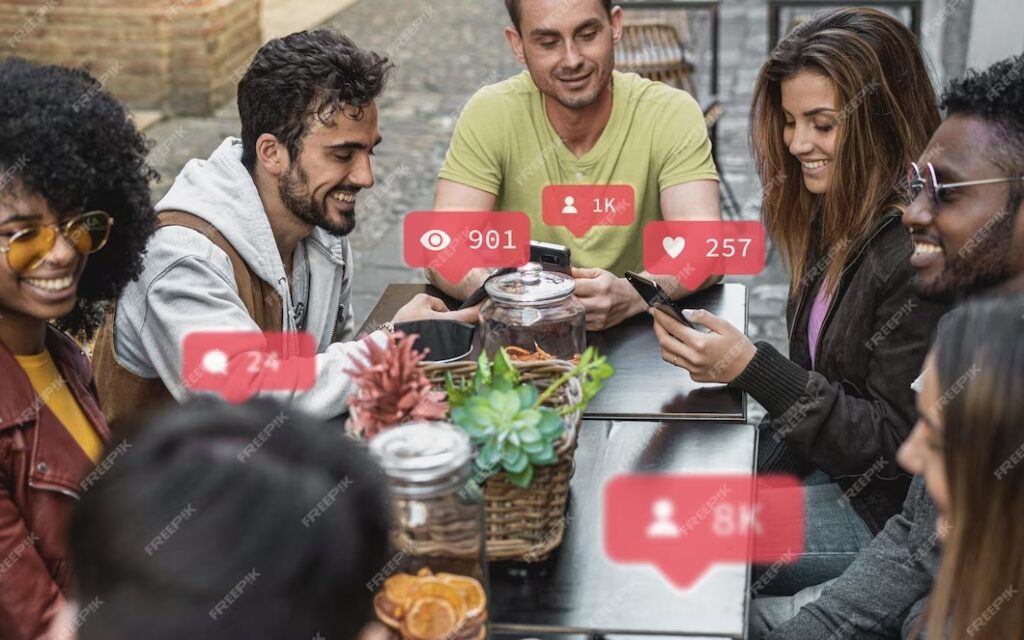Bandcamp benefits: Bandcamp has emerged as a beacon of hope for independent musicians and small labels in the ever-evolving landscape of the music industry. In this digital era, where streaming giants dominate, Bandcamp stands apart as a platform designed to empower artists.
This article delves into the world of Bandcamp, focusing solely on its remarkable benefits. We will explore how Bandcamp simplifies music distribution, offers a revenue model that favors artists. We will also see how it fosters fan engagement and community, and grants artists unparalleled control over their content and financial destiny.
Join us in uncovering why Bandcamp has become a haven for musicians seeking creative autonomy and financial sustainability.

Easy Music Distribution
One of Bandcamp’s standout features is its ability to simplify the often complex process of music distribution. For independent artists and small record labels, this aspect alone can be a game-changer.
Unlike traditional distribution models that involve intermediaries and lengthy processes, Bandcamp allows musicians to directly upload their music to the platform. This direct-to-fan approach means artists can reach their audience without the need for a middleman. Thus reducing the barriers to entry into the music market.
Furthermore, Bandcamp supports a variety of file formats, ensuring that artists have flexibility in how they present their music. Whether it’s high-quality WAV files, compressed MP3s, or even lossless formats like FLAC, Bandcamp accommodates different preferences and audiophile demands.
This simplicity extends to the ease of uploading music. Artists can quickly add new tracks or albums, set release dates, and even offer pre-orders, all from an intuitive dashboard. The platform also provides tools for organizing discographies, making it easy for fans to explore an artist’s entire body of work.
For artists looking to maintain control over their music distribution and reach their audience directly, Bandcamp’s user-friendly approach is a breath of fresh air. It empowers musicians to focus on what they do best – creating music – without being bogged down by the complexities of traditional distribution channels. In the next sections, we will explore more benefits that make Bandcamp an attractive choice for artists and creators in the digital age.
Artist-Friendly Revenue Model
Bandcamp’s revenue-sharing model is a pivotal reason why it has gained immense popularity among independent musicians. Unlike some other streaming platforms that offer artists only a fraction of a cent per stream, Bandcamp takes a different approach that is undeniably artist-friendly.

On Bandcamp, artists retain a significant portion of the revenue generated from their music sales. The platform typically takes a modest commission (around 10-15%) on digital sales and a slightly higher percentage on physical merchandise. This contrasts starkly with the minuscule payouts per stream offered by some major streaming services.
Moreover, Bandcamp encourages fans to support artists directly through a “name your price” feature. This allows fans to pay what they think the music is worth or what they can afford, which often leads to more generous contributions.
Artists have the flexibility to set minimum prices, but this option fosters a sense of community and appreciation that can be lacking on other platforms.
Bandcamp Fridays, a monthly event initiated by the platform, has further bolstered artist earnings. On these special days, Bandcamp waives its revenue share, ensuring that all proceeds from sales go directly to the artists. This has become a celebrated opportunity for fans to show their support by purchasing music, which can significantly boost an artist’s income.
The result is a revenue model that aligns the interests of artists and fans, creating a symbiotic relationship where artists are fairly compensated for their work, and fans have the satisfaction of knowing their support directly benefits the creators they love.
In an industry where earning a sustainable income can be challenging, Bandcamp’s approach provides a lifeline for artists seeking financial stability while pursuing their passion for music. Next, we’ll delve into how Bandcamp fosters fan engagement and builds a unique sense of community around music.
Fan Engagement and Community Building
Bandcamp stands out as a platform that prioritizes fan engagement and community building, creating an environment where artists and their supporters can connect on a deeper level.
One of the key features that fosters fan engagement is the ability for artists to communicate directly with their audience. Fans can follow their favorite artists on Bandcamp, receiving updates about new releases, merchandise, and other announcements. This direct line of communication empowers artists to build a loyal and engaged fan base.
Additionally, Bandcamp allows artists to offer exclusive content to their fans. This might include bonus tracks, early access to new music, or behind-the-scenes content. This exclusivity encourages fans to become more invested in the artist’s work, creating a sense of belonging to a special community.

Bandcamp also facilitates interaction through its comments section. Fans can leave comments on an artist’s page, providing feedback, expressing their appreciation, or simply connecting with other like-minded listeners. This dynamic interaction can make fans feel heard and valued, deepening their connection to the artist and the music.
Furthermore, the platform’s subscription feature enables artists to offer ongoing content to subscribers. Fans pay a monthly fee to access exclusive music, updates, and more. This recurring revenue stream not only supports artists financially but also encourages a long-term, sustainable connection with fans.
Bandcamp’s emphasis on community extends to its “Fan Accounts” feature, where users can curate collections of their favorite music and share them with others. This feature enables fans to become advocates for the artists they love, spreading the word and helping to expand an artist’s reach.
In essence, Bandcamp goes beyond being a simple distribution platform; it’s a space where artists and fans can forge meaningful connections. This sense of community is invaluable in today’s music industry, where building a dedicated fan base can be just as important as selling records. In the following sections, we’ll explore how Bandcamp empowers artists with customization and control over their content.
Customization and Control
Bandcamp grants artists a level of customization and control over their content that is unparalleled in the music industry.
One of the standout features is the ability for artists to design and personalize their Bandcamp pages. Artists can choose from various templates or even create custom designs that reflect their unique brand and style. This level of customization allows for a consistent and professional online presence that aligns with the artist’s identity.
Furthermore, Bandcamp allows artists to set their pricing for digital music and merchandise. This pricing flexibility empowers musicians to make strategic decisions based on their audience and market positioning. Whether it’s offering a “pay what you want” model, tiered pricing, or limited-time discounts, artists have the freedom to experiment and adapt to different strategies.
Another aspect of control lies in the release strategy. Artists can schedule their album releases, allowing them to build anticipation and momentum leading up to the launch. This contrasts with some streaming platforms where music can be instantly released, potentially missing out on valuable promotional opportunities.
Additionally, artists have control over the types of files they offer for download. They can provide high-quality formats like WAV or FLAC for audiophiles who appreciate top-notch sound, while still offering standard MP3s for broader accessibility.
Bandcamp also offers artists the ability to sell physical merchandise, such as vinyl records, CDs, and merchandise bundles, directly to their fans. This comprehensive approach enables musicians to manage their entire music catalog and merchandise sales from a single platform.
In essence, Bandcamp empowers artists to take charge of their branding, pricing, release strategy, and merchandise sales. This level of customization and control is invaluable in an industry where artists often struggle to maintain creative autonomy and financial independence. In the next section, we’ll explore how Bandcamp’s direct sales and financial benefits further empower musicians.
Direct Sales and Financial Benefits
Bandcamp’s emphasis on direct sales is a boon for artists seeking financial independence and stability. Here, we’ll explore the advantages of selling music and merchandise directly to fans through the platform.
- Higher Revenue Share: One of the most significant financial benefits of Bandcamp is the generous revenue share for artists. When fans purchase music or merchandise, a more substantial portion of the sale goes directly to the artist compared to many other distribution channels. This means artists can earn more from each sale, helping them sustain their music careers.
- Control Over Pricing: Bandcamp allows artists to set their own pricing for digital music and physical merchandise. This control enables artists to experiment with pricing strategies, bundle offerings, and even offer “name your price” options. Such flexibility is crucial for tailoring their sales approach to their unique fan base.
- Direct-to-Fan Sales: The platform facilitates direct communication and transactions between artists and fans. This direct relationship fosters a sense of community and loyalty, encouraging fans to support their favorite artists by purchasing music and merchandise. Artists can also incentivize sales through exclusive content and offers.
- Sustainable Income: For many independent artists, Bandcamp provides a platform for generating a consistent and sustainable income. The ability to sell music and merchandise directly to a dedicated fan base allows artists to rely less on the uncertainties of streaming revenue and focus on building a financially stable career.
- Bandcamp Fridays: The platform’s initiative to waive its revenue share on designated “Bandcamp Fridays” has been a significant financial boost for artists. On these days, all revenue from sales goes directly to the artists, encouraging fans to make purchases and support their favorite musicians.
In summary, Bandcamp’s direct sales approach and artist-friendly revenue model empower musicians to take control of their financial destiny. It offers a platform where artists can earn a fair income while building strong connections with their fans. In the upcoming section, we’ll delve into Bandcamp’s robust analytics and data insights, which further aid artists in making informed decisions about their music careers.
Analytics and Data Insights

Bandcamp equips artists with valuable analytics and data insights, enabling them to make informed decisions about their music careers. Here’s a closer look at how these tools benefit musicians:
- Sales and Engagement Metrics: Bandcamp provides artists with detailed data on sales, including the number of purchases, revenue generated, and the geographical locations of buyers. This information is invaluable for understanding which songs, albums, or merchandise items resonate most with their audience.
- Fan Demographics: Artists can access demographic data about their fans, including age, location, and gender. This insight helps them tailor their marketing efforts and content to better connect with their target audience.
- Streaming and Download Trends: Bandcamp’s analytics reveal trends in streaming and download activity over time. Artists can track which songs are gaining popularity, helping them decide which tracks to prioritize for promotion or future releases.
- Traffic Sources: Artists can see where their fans are coming from, whether it’s from social media, search engines, or direct links. This knowledge helps them focus their promotional efforts on the platforms that yield the most traffic and engagement.
- Sales Funnel Analysis: Bandcamp provides a comprehensive view of the sales funnel, showing how fans discover an artist’s music, engage with it, and ultimately make purchases. This allows artists to optimize their strategies for converting listeners into paying fans.
- Merchandise Insights: For artists selling physical merchandise on Bandcamp, the platform offers data on which items are selling best and which formats (e.g., vinyl, CDs, t-shirts) are most popular among fans.
- Release Timing: Artists can track the performance of their releases over time. This information helps them understand the impact of release timing, whether it’s a single, album, or EP, and adjust their release strategies accordingly.
- Comparison with Industry Averages: Bandcamp provides benchmarks and industry averages to help artists gauge their performance against broader trends in the music industry.
By leveraging these analytics and data insights, artists can make data-driven decisions about their music promotion, release strategies, and fan engagement efforts. This empowers them to refine their approach, grow their fan base, and ultimately build a more successful and sustainable music career. In the following section, we’ll explore how Bandcamp supports discoverability and self-promotion for artists.
Discoverability and Promotion
Discoverability and self-promotion are vital aspects of an artist’s journey, and Bandcamp provides a range of tools and features to support both.
- Search and Discovery: Bandcamp offers a robust search and discovery engine that allows music enthusiasts to explore a vast catalog of independent music. Users can search for artists, genres, or keywords, making it easier for fans to find new music that aligns with their tastes.
- Tagging and Genre Placement: Artists can tag their music with relevant keywords and genres. This tagging system helps their music appear in searches and genre-specific collections, increasing the chances of discovery by users interested in those categories.
- Recommendations: Bandcamp’s recommendation algorithms suggest music to users based on their listening history and preferences. This feature can introduce fans to new artists and albums, enhancing discoverability for independent musicians.
- Bandcamp Weekly: The platform hosts a curated show called “Bandcamp Weekly,” featuring a selection of noteworthy releases. Artists who are featured on the show gain additional exposure to a global audience.
- Fan Engagement Tools: Bandcamp provides artists with tools to engage with their fans directly. Artists can send email updates, share news about upcoming releases, and interact with their fan base. These interactions foster a sense of community and encourage fans to explore an artist’s music further.
- Social Media Integration: Bandcamp seamlessly integrates with social media platforms, allowing artists to share their music and updates with their followers. This integration extends an artist’s reach beyond the Bandcamp platform, tapping into existing social networks.
- Promotion Through Merchandise: Selling merchandise such as t-shirts, vinyl records, and posters alongside music can be an effective form of promotion. Fans who purchase these items become walking advertisements for the artist’s brand.
- Collaborative Promotion: Artists can collaborate with other musicians or labels on Bandcamp, cross-promoting each other’s work to expand their reach and fan base.
Bandcamp’s focus on discoverability and self-promotion empowers artists to actively engage with their audience and increase their visibility. It’s a platform that not only provides exposure but also encourages artists to take an active role in building their fan base. In the upcoming section, we’ll explore how Bandcamp complements an artist’s presence on other platforms.
Integration with Other Platforms
Bandcamp recognizes that artists often maintain a presence on multiple platforms, and it offers seamless integration to complement an artist’s online presence.
- Website Integration: Bandcamp provides tools and widgets that artists can embed directly on their websites. This integration allows artists to sell music and merchandise without redirecting fans to external pages. It maintains a cohesive online presence and offers a seamless shopping experience.
- Social Media Links: Artists can link their Bandcamp profiles to their social media accounts, making it easy for fans to discover and follow them across various platforms. This cross-linking strengthens an artist’s online presence and helps fans stay updated on their latest releases and news.
- Streaming Services Integration: While Bandcamp primarily focuses on direct sales, it also allows artists to link to streaming services like Spotify, Apple Music, or YouTube. This enables fans to explore an artist’s music on their preferred streaming platform, broadening an artist’s reach.
- Email Marketing Integration: Bandcamp provides tools for artists to collect fan emails and send updates directly from the platform. These email lists can be used for targeted marketing campaigns, keeping fans engaged and informed about upcoming releases and events.
- Collaborations and Remixes: Bandcamp encourages collaboration among artists. Musicians can easily feature other artists on their Bandcamp pages, promoting cross-collaboration and potentially introducing their fan base to new talent.
- Cross-Promotion: Artists can use Bandcamp to promote their music and merchandise sales on other platforms. This synergy allows them to leverage the strengths of each platform while maintaining control and branding consistency.
- Analytics Integration: Bandcamp’s analytics can also be integrated into other marketing and analytics tools, providing a comprehensive view of an artist’s performance across multiple platforms. This data-driven approach aids in making informed decisions about promotional strategies.
By offering integration with various online platforms and tools, Bandcamp enhances an artist’s ability to reach a wider audience while maintaining control over their content and brand identity. It acts as a central hub for artists to manage and promote their music effectively. In the next section, we’ll delve into real-world case studies to illustrate the practical benefits that artists have experienced on Bandcamp.
Case Studies
To illustrate the practical benefits of Bandcamp for independent musicians, let’s explore a few real-world case studies of artists who have found success on the platform.
Case Study 1: Amanda, the Independent Singer-Songwriter
Amanda is an emerging singer-songwriter with a small but dedicated fan base. She started using Bandcamp to release her music independently. The platform’s “name your price” feature allowed her fans to support her even when they were tight on funds.
By engaging with her audience through Bandcamp’s messaging system and offering exclusive content to subscribers, Amanda steadily grew her fan base. She used the revenue from Bandcamp to fund her studio recordings and merchandise, eventually gaining enough momentum to embark on her first tour.
Case Study 2: The Indie Band, “Echoes of Tomorrow”
“Echoes of Tomorrow” is an indie rock band with a loyal following. They utilized Bandcamp to sell vinyl records and merchandise directly to their fans. Through Bandcamp Fridays, they attracted a surge in sales, especially for their limited-edition vinyl releases.
The revenue generated on these days allowed them to fund their next album production entirely. The band’s close interaction with fans through Bandcamp’s messaging system and fan engagement tools resulted in a dedicated and supportive community.
The Power of Bandcamp for Independent Musicians
DJ Mike, an electronic music producer, decided to release his music on Bandcamp after growing frustrated with low streaming payouts on other platforms. He offered high-quality downloads in various formats, including FLAC for audiophiles.
His fans appreciated the option to choose their preferred audio quality, and many were willing to pay more for lossless files. This approach significantly increased his earnings per release, allowing him to reinvest in his studio setup and focus on creating more music.
Case Study 4: Sarah, the Collaborative Artist
Sarah collaborated with other musicians frequently and used Bandcamp to showcase these collaborations. By featuring her collaborators on Bandcamp and cross-promoting each other’s pages, they created a network of mutual support.
This strategy introduced her to new audiences, and the “pay what you want” pricing model led to higher contributions from fans. The collaborative approach not only expanded her fan base but also enriched her artistic journey.
These case studies highlight the diverse ways in which artists can leverage Bandcamp’s features to achieve their goals. Whether it’s building a fan base, funding new projects, offering unique pricing options, or collaborating with others, Bandcamp provides the tools and flexibility for musicians to find success on their terms. In conclusion, Bandcamp offers a compelling platform for artists seeking creative autonomy and financial sustainability in the music industry.
Conclusion
Bandcamp stands as a beacon of hope and empowerment for independent musicians and small labels in the music industry. With a focus on artist-friendly features such as direct sales, fair revenue sharing, and robust fan engagement tools, Bandcamp enables artists to take control of their careers.
Its emphasis on customization, discoverability, and integration with other platforms amplifies the impact of their work. Real-world case studies highlight the platform’s practical benefits.
In a music landscape dominated by streaming giants, Bandcamp’s commitment to artists’ creative autonomy and financial sustainability makes it an invaluable ally for those who dare to forge their path in the world of music.
FAQs
Bandcamp is a music platform that allows artists to upload, sell, and promote their music and merchandise directly to fans. Unlike some streaming platforms, Bandcamp offers artists a fair revenue share, customization options, and tools for fan engagement, making it a standout choice for independent musicians.
Yes, artists have full control over pricing on Bandcamp. They can set prices for digital music, merchandise, and even offer a “name your price” option, allowing fans to choose what they pay.
Bandcamp provides artists with tools to communicate directly with fans, offer exclusive content, and build a sense of community. Fans can follow artists, leave comments, and subscribe for access to special releases and updates.
Artists can sell both music and merchandise on Bandcamp. This includes vinyl records, CDs, t-shirts, and more. The platform offers a one-stop solution for managing music and merchandise sales.
Bandcamp Fridays are special days when the platform waives its revenue share, ensuring that all revenue from sales goes directly to artists. These events encourage fans to make purchases, providing a significant financial boost to musicians and helping them sustain their careers.
